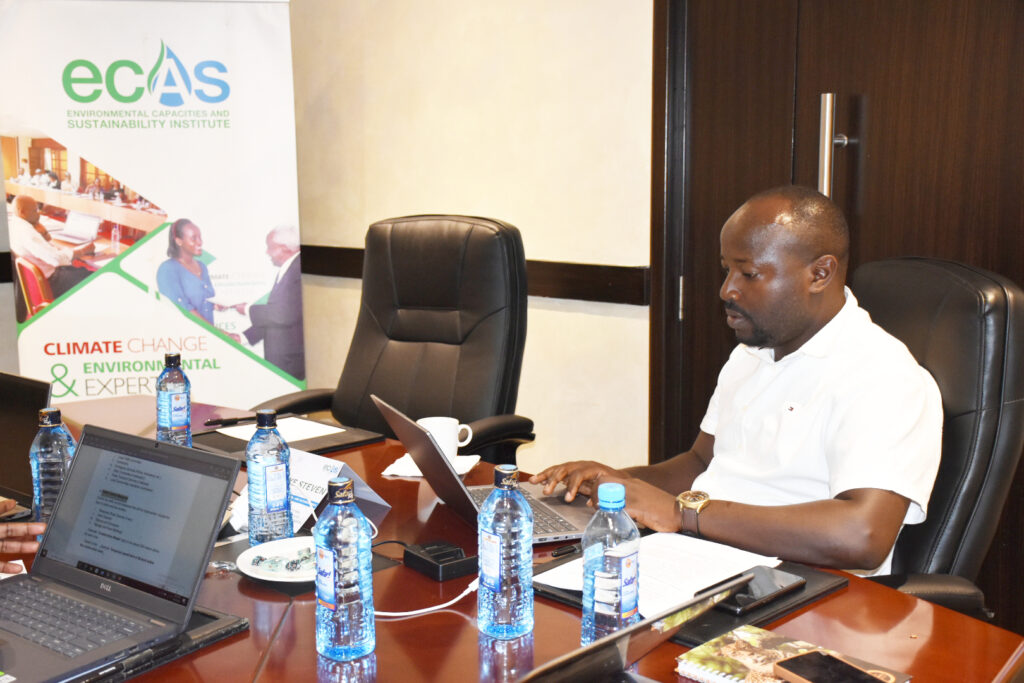
CONCEPT NOTE
INTERNATIONAL TRAINING ON THE RESEARCH AND REPORTING TOOLKIT FOR ORGANIZATIONS
COURSE BACKGROUND
In today’s results-driven development and policy landscape, organizations are expected not only to deliver programs effectively but also to document their impact, generate evidence, and share learning in compelling ways. Research and reporting are no longer optional—they are essential tools for strategic decision-making, resource mobilization, accountability, and policy influence.
However, many organizations struggle with fragmented research processes, inconsistent report quality, or poor integration of evidence into programming and advocacy. Challenges often include unclear research questions, weak data analysis, overly technical writing, and reporting formats that fail to engage key audiences such as donors, communities, or policymakers.
Recognizing these challenges, the Environmental Capacities and Sustainability Institute (ECAS) offers this hands-on course to empower teams with a practical and adaptable research and reporting toolkit. The course helps participants understand how to design research with purpose, collect and analyze data rigorously, and produce reports that are clear, credible, and actionable.
Through real-world examples, templates, collaborative exercises, and expert feedback, participants will build the confidence and skills needed to turn evidence into influence—and reports into powerful tools for change.
COURSE OBJECTIVES OF THE TRAINING
By the end of this course, participants will be able to:
- Design practical and policy-relevant research studies aligned with organizational goals.
- Collect, analyze, and interpret qualitative and quantitative data effectively.
- Structure clear, coherent, and compelling reports for various audiences.
- Link findings to recommendations and strategic narratives.
- Use reporting to support advocacy, fundraising, and decision-making.
- Apply ethical standards and quality assurance in organizational research and publications.
WHAT YOU WILL LEARN
By the end of this course participants will have a clear understanding of :
- How to align research efforts with strategic organizational goals
- Techniques for gathering and managing reliable data from the field and secondary sources
- Best practices for analyzing qualitative and quantitative data
- How to write clear, impactful reports tailored to specific audiences
- Strategies for transforming research into advocacy and knowledge-sharing tools
- Practical skills in using templates, software tools, and visualizations to enhance reporting
- The role of peer review and feedback in improving research quality
DURATION AND PROGRAM
TARGET PARTICIPANTS
This course is designed for professionals involved in research, reporting, monitoring and evaluation, strategic communications, and program management within NGOs, government agencies, international organizations, and research institutions. It is particularly relevant for teams responsible for producing donor reports, policy briefs, evaluation documents, knowledge products, and advocacy materials. Whether you’re a researcher, project officer, communication specialist, or M&E focal point, this course equips you with the tools to strengthen evidence-based reporting and improve your organization’s influence and accountability.
TRAINING STYLE
The modules will be taught through PowerPoint presentations, and lectures and will include a case study/field visit, breakout sessions, case studies and other interactive discussion components.
The course will also include a few guest speakers, both in person and via Zoom and other online learning platforms for overseas speakers. This provides useful real-world insights alongside the more theoretical aspects of the course.
The conference faculty shall consist of experienced decision makers, as well as practitioners and representatives from established educational and research institutions active around climate change, engineering and international development. Throughout the course, theoretical presentation of concepts will be moderated and more group discussions and plenary engagements will be optimized. PowerPoint presentations will be made by facilitators and resource persons, to highlight key concepts before embarking on group work.
TRAINING MODULES
| No | Module | Details | |
| 1. | Research Planning and Design |
This module introduces participants to the fundamentals of planning practical, actionable, and policy-relevant research tailored to organizational needs.
Topics:
|
|
| 2. | Data Collection and Management |
Explore strategies and tools for gathering high-quality data in field and institutional contexts.
Topics:
|
|
| 3. | Data Analysis and Interpretation |
This module builds capacity to make sense of data through clear, structured, and context-sensitive analysis.
Topics:
|
|
| 4. | Writing Effective Research and Evaluation Reports |
Learn how to communicate findings clearly and convincingly to different audiences through professional reporting techniques.
Topics:
|
|
|
5.
|
Strategic Reporting and Knowledge Sharing |
This module covers how organizations can use reporting not just for documentation, but also for influence and learning.
Topics:
|
|
| 6. | Hands-On Application and Peer Review |
Participants apply their learning through a practical group exercise, draft report sections, and receive peer and expert feedback.
Topics:
|
|
GENERAL NOTES
- Training manuals and additional reference materials are provided to the participants.
- Upon successful completion of this course, participants will be issued with a certificate.
- We can also do this as a tailor-made course to meet organization-wide needs. Contact us to find out more: info@ecasiafrica.org.
- Payment should be sent to our bank account before the start of training and proof of payment sent to: info@ecasiafrica.org.
ABOUT ECAS INSTITUTE
The ECAS Institute designs and delivers independent and targeted training, research, and consulting services. Our work focusses on climate change and resilience building, carbon markets, renewable energy, nature-based solution, biodiversity conservation, agriculture and food systems, We are located in Nairobi Kenya and work across the African region. We have implemented training and research assignments in Kenya, Tanzania, Uganda, South Sudan, Somalia, Malawi, Rwanda, Congo, and South Africa. Globally, we have supported our partners from the UK, Denmark, Italy, Sweden, Germany, and USA.

